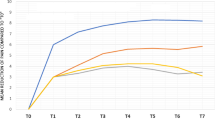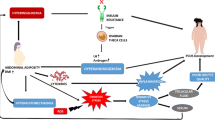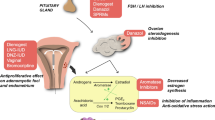Abstract
Purpose
Polycystic ovarian syndrome (PCOS) is a common reproductive disorder. Increasing serum prolactin in these patients could be detected in both follicular and luteal phase of the normal and stimulated cycles. Hyperprolactinemia affects the hypothalamic–pituitary–ovarian axis causing anovulation and abnormal uterine bleeding. In this study, the efficacy of combined cabergoline and metformin therapy was compared to metformin therapy alone in patients with PCOS on the body mass index, androgen profile and menstrual cycle regulation.
Methods
Two hundred and fifty patients with polycystic ovarian syndrome (PCOS) with increased serum prolactin were randomly allocated into two groups: group (1) received oral metformin tablet 1000 mg per day and cabergoline 0.5 g tablet weekly for 3 months as a case group, and group (2) received oral metformin tablet 1000 mg per day and a placebo tablet weekly for 3 months as the control group (n = 123). Body mass index (BMI), menstrual cycle regularity, serum testosterone, serum prolactin and dehydroepiandrosterone sulfate (DHEAS) level were compared before and after treatment in both groups.
Results
There was significant decrease in body mass index and improvement of androgenic profile in both groups after treatment. In group (1), there was significant improvement in cycle regularity and significant decrease in serum prolactin level post-treatment.
Conclusions
The use of cabergoline in addition to metformin had more favorable effect on cycle regularity and prolactin level in patients with polycystic ovarian syndrome with hyperprolactinemia than the use of metformin alone.

Similar content being viewed by others
References
Bachelot A. Polycystic ovarian syndrome: clinical and biological diagnosis. Ann Biol Clin (Paris). 2016;74(6):661–7.
Melgar V, Espinosa E, Sosa E, et al. Current diagnosis and treatment of hyperprolactinemia. Rev Med Inst Mex Seguro Soc. 2016;54(1):111–21.
Kurina AU, Pronina TS, Dilmukhametova LK, et al. Cooperative synthesis of dopamine in rat mediobasal hypothalamus as a compensatory mechanism in hyperprolactinemia. Biochem (Mosc). 2017;82(3):366–72.
Lee DY, Oh YK, Yoon BK, et al. Prevalence of hyperprolactinemia in adolescents and young women with menstruation-related problems. Am J Obstet Gynecol. 2012;206(3):213.e1–5.
Paepegaey AC, Veron L, Wimmer MC, et al. Misleading diagnosis of hyperprolactinemia in women. Gynecol Obstet Fertil. 2016;44(3):181–6.
Huang T, Chen PC, Wu MH, et al. Metformin improved health-related quality of life in ethnic Chinese women with polycystic ovary syndrome. Health Qual Life Outcomes. 2016;14(1):119.
Nachtigall LB. Cabergoline for hyperprolactinemia: getting to the heart of it. Endocrine. 2017;1–3. doi:10.1007/s12020-017-1271-z.
Matthews ML. Abnormal uterine bleeding in reproductive-aged women. Obstet Gynecol Clin N Am. 2015;42(1):103–15.
Capozzi A, Scambia G, Pontecorvi A, et al. Hyperprolactinemia: pathophysiology and therapeutic approach. Gynecol Endocrinol. 2015;31(7):506–10.
Ghaneei A, Jowkar A, Hasani Ghavam MR, et al. Cabergoline plus metformin therapy effects on menstrual irregularity and androgen system in polycystic ovary syndrome women with hyperprolactinemia. Iran J Reprod Med. 2015;13(2):93–100.
Ferrero H, Garcia-Pascual CM, Pellicer N, et al. Dopamine agonist inhibits vascular endothelial growth factor protein production and secretion in granulosa cells. Reprod Biol Endocrinol. 2015;13:104.
Chen H, Fu J, Huang W. Dopamine agonists for preventing future miscarriage in women with idiopathic hyperprolactinemia and recurrent miscarriage history. Cochrane Database Syst Rev. 2016;7:CD008883.
Pala NA, Laway BA, Misgar RA, et al. Metabolic abnormalities in patients with prolactinoma: response to treatment with cabergoline. Diabetol Metab Syndr. 2015;7:99.
Krysiak R, Okrzesik J, Okopien B. Different effects of metformin on the hypothalamic-pituitary-thyroid axis in bromocriptine- and cabergoline-treated patients with hashimoto’s thyroiditis and glucose metabolism abnormalities. Exp Clin Endocrinol Diabetes. 2015;123(9):561–6.
Mohammadbygi R, Yousefi SR, Shahghaybi S, et al. Effects of Cabergoline administration on uterine perfusion in women with polycystic ovary syndrome. Pak J Med Sci. 2013;29(4):919–22.
Corbett S, Shmorgun D, Claman P, et al. The prevention of ovarian hyperstimulation syndrome. J Obstet Gynaecol Can. 2014;36(11):1024–33.
Acknowledgements
I would like to thank Dr. Mahmoud Hamdy the chemical pathology consultant for his help to complete of this work. Also I would like to thank all participants.
Author information
Authors and Affiliations
Corresponding author
Ethics declarations
Conflicts of interest
The author declares that she has no conflict of interest.
Ethical Approval
All procedures performed in studies involving human participants were in accordance with the ethical standards of the institutional and/or national research committee and with the 1964 Declaration of Helsinki and its later amendments or comparable ethical standards.
Informed Consent
The study protocol was approved by the ethics committee of Hai Jamma hospital. All participants were counseled and informed about the trial protocol and a written informed consent according to declaration of Helsinki was signed. A randomized clinical study approved that the use of combined cabergoline and metformin had a better impact on the control of prolactin level and cycle regulation in patients with both PCO and hyperprolactinemia.
Additional information
Mervat Ali Mohamed Elsersy is a Lecturer in Department of Obstetrics and Gynecology, Faculty of Medicine, Alexandria University, Egypt.
Rights and permissions
About this article
Cite this article
Elsersy, M.A.M. Efficacy of Combined Cabergoline and Metformin Compared to Metformin Alone on Cycle Regularity in Patients with Polycystic Ovarian Disease with Hyperprolactinemia: A Randomized Clinical Trial. J Obstet Gynecol India 67, 363–369 (2017). https://doi.org/10.1007/s13224-017-1022-3
Received:
Accepted:
Published:
Issue Date:
DOI: https://doi.org/10.1007/s13224-017-1022-3




